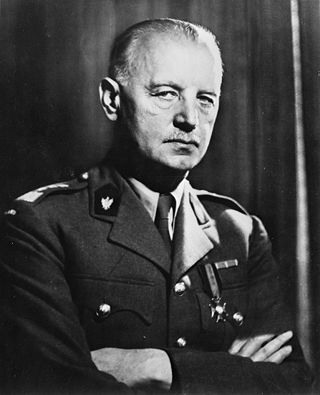
Władysław Eugeniusz Sikorski was a Polish military and political leader.

Rawa (Rawicz), is a coat of arms of Polish origin. It was borne by several noble families of Polish–Lithuanian Commonwealth, Russian Empire and Ukraine.

Władysław Raginis was a Polish military commander during the Invasion of Poland in 1939 of a small force holding the Polish fortified defense positions against a vastly larger German force during the Battle of Wizna. Because the positions were held at great cost for three days before being annihilated with few survivors, Wizna is referred to as the Polish Thermopylae and Captain Raginis as a modern Leonidas.
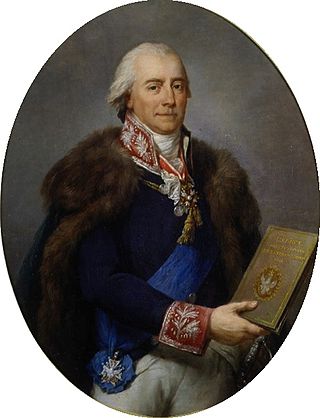
Count Tomasz Adam Ostrowski was a Polish nobleman (szlachcic), politician, spokesman, statesman and Count since 1798.

Bolesław Ignacy Florian Wieniawa-Długoszowski was a Polish general, adjutant to Chief of State Józef Piłsudski, politician, freemason, diplomat, poet, artist and formally for one day the President of the Republic of Poland.
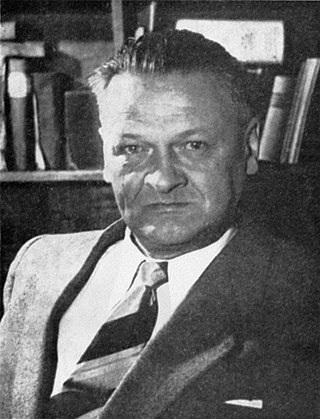
Władysław Kazimierz Broniewski was a Polish poet, writer, translator and soldier. Known for his revolutionary and patriotic writings.

Aleksander Świętochowski was a Polish writer, educator, and philosopher of the Positivist period that followed the January 1863 Uprising.

Juliusz Karol Wilhelm Józef Rómmel was a Polish military commander, a general of the Polish Armed Forces.

The War Order of Virtuti Militari is Poland's highest military decoration for heroism and courage in the face of the enemy at war. It was created in 1792 by Polish King Stanislaus II Augustus and is the oldest military decoration in the world still in use.

The Polish Museum, Rapperswil, was founded in Rapperswil, Switzerland, on 23 October 1870, by Polish Count Władysław Broel-Plater, at the urging of Agaton Giller, as "a refuge for Poland's historic memorabilia dishonored and plundered in the [occupied Polish] homeland" and for the promotion of Polish interests.
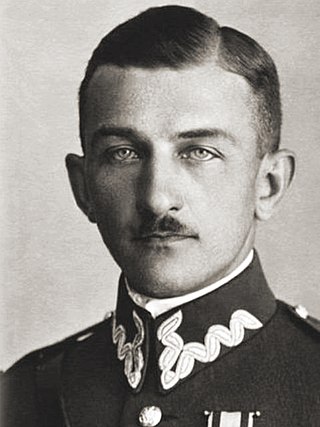
Tadeusz Klimecki – Brigadier General of the Polish Army, Chief of Polish General Staff.
Marceli Kosman was a Polish historian who was a professor at the Adam Mickiewicz University in Poznań.
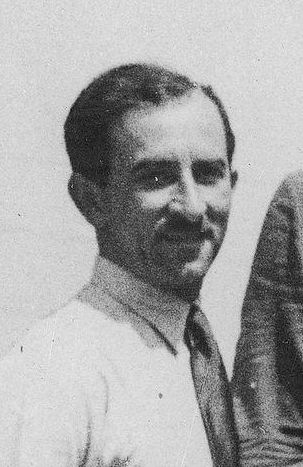
Władysław Dobrowolski was a Polish fencer and track and field athlete and major of the Polish Army in the defense of Warsaw during World War II. During the interwar period, he won a bronze medal in the team sabre event at the 1932 Summer Olympics.

Tomasz Andrzej Adam Łubieński, comte de Pomian was a brigadier general in the Polish army, senator, landowner in Kalisz and businessman. Hoping to liberate Poland, he fought on the French side in the Napoleonic Wars, fighting at Essling, Wagram, Dresden, Ulm, Leipzig, Hanau and Berezina, for which Napoleon made him a baron de l'Empire. He also later took part in the November Uprising against Russia.

Ignacy Hugo Stanisław Matuszewski was a Polish politician, publicist, diplomat, Minister of Finance of the Second Polish Republic, colonel, infantry officer and intelligence agent of the Polish Army, member of the International Olympic Committee. A strong supporter of Józef Piłsudski, he was counted among the "Colonels" and co-founded the Józef Piłsudski Institute of America.

Stefan Kossecki (1889–1940) was a soldier of the Imperial Russian Army, and Colonel of Infantry of the Polish Army in the Second Polish Republic. Captured by the Soviets in 1939, he was murdered by the NKVD in 1940. On November 9, 2004, Kossecki was posthumously promoted to General brygady.

Gustaw Paszkiewicz was a soldier of the Imperial Russian Army, and officer of the Polish Army. He entered the military service in 1914, at the age of 22, fighting as Russian soldier in World War I. Paszkiewicz was a soldier until 1952.
The Sebbirozi was a tribe mentioned by the 9th-century Bavarian Geographer (BG). It states that the Sebbirozi inhabit 90 settlements.

Bernard Stanisław Śliwiński (1883-1941) was a Polish doctor of law, insurgent during the Greater Poland uprising, Lieutenant colonel in the Polish Armed Forces infantry, district commander of the state police, Mayor of Bydgoszcz and recipient of the Knight's Cross of the Order of Virtuti Militari.
Antoni Dyboski, born as Antoni Dybka was a Polish lawyer and activist.


















